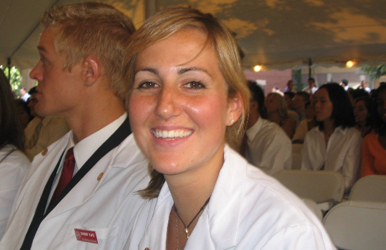Ending Africa’s Brain Drain
MED student’s film will explore Lesotho’s health-care needs

Kara-Lee Pool is the daughter of a physician who left Cape Town, South Africa, to set up a medical practice in Houston. Now Pool (MED’08), a student at BU’s School of Medicine, is heading off to Lesotho, a landlocked country surrounded by South Africa, to make a film that will document, among other things, the harm done by that country’s brain drain.
“I’ve always had it in my head that I want to go back,” says Pool. “We hope that this film will convey the reasons for the brain drain, and those reasons are more than just money. We also hope to show what the Lesotho-Boston Health Alliance (LBHA) is doing to stop the drain: setting up residency programs and working with the medical environment in Lesotho.”
Lesotho, says Pool, is in desperate need of a sound medical system. The country of two million has a 29 percent rate of HIV/AIDS infection and a patient-to-physician ratio of one for every 15,000 to 25,000 people.
Pool, who has never made a film, has been awarded $10,000 by the American Medical Association Foundation to help pay for the project. She also received smaller amounts from Global Primary Care, Inc., a nonprofit organization started by the School of Medicine; from the Sarah’s Wish Foundation; and from MED in the form of a travel grant. Pool reports that she is fast approaching her goal of $21,000.
Finding financial backing for the film may be the easy part. Pool’s looming challenge is to pack into 30 minutes of film the deep and expanding efforts of the Lesotho-Boston Health Alliance, a collaboration between the University and Boston Medical Center in Lesotho. Those efforts got off the ground four years ago, when William Bicknell, a School of Public Health professor of international health and LBHA director, visited the country and pledged his support. Since then, BU and BMC have sent 15 faculty and staff and 17 students to Lesotho to work in various aspects of the program.
Film coproducer Lauren Babich (SPH’05), deputy director of the department of family medicine at BMC and deputy director of LBHA, says the program, which was recently expanded to include the School of Management, is poised for a growth spurt. In late June, LBHA directors will meet with representatives of all BU schools and colleges, she says, and invite them to think about what kind of programs they might set up in Lesotho.
“This film is really going to highlight all that we’ve done over there,” says Babich. “It will talk about efforts to combat the shortage of doctors and nurses and our plans to improve the system and maximize the use of resources.” Those plans, she says, will attempt to combat the three main reasons that medical professionals choose to work elsewhere: compensation, work environment, and career development.
“We are addressing each of those areas,” Babich says. “We are trying to improve the management of the medical system and make the most of resources, both human and monetary.”
“If we can fix things there,” she says. “We can fix things anywhere.”
Pool believes that the LBHA can at least jump-start a fix to Lesotho’s problems, and she hopes that her film will serve as a “videographic teaching module” that will point health-care professionals worldwide to ways they can make similar improvements in their home countries. She intends to start filming in mid-July and wrap up the shoot in early August. The final cut, she says, will be presented on December 1, World AIDS Day.
Art Jahnke can be reached at jahnke@bu.edu.